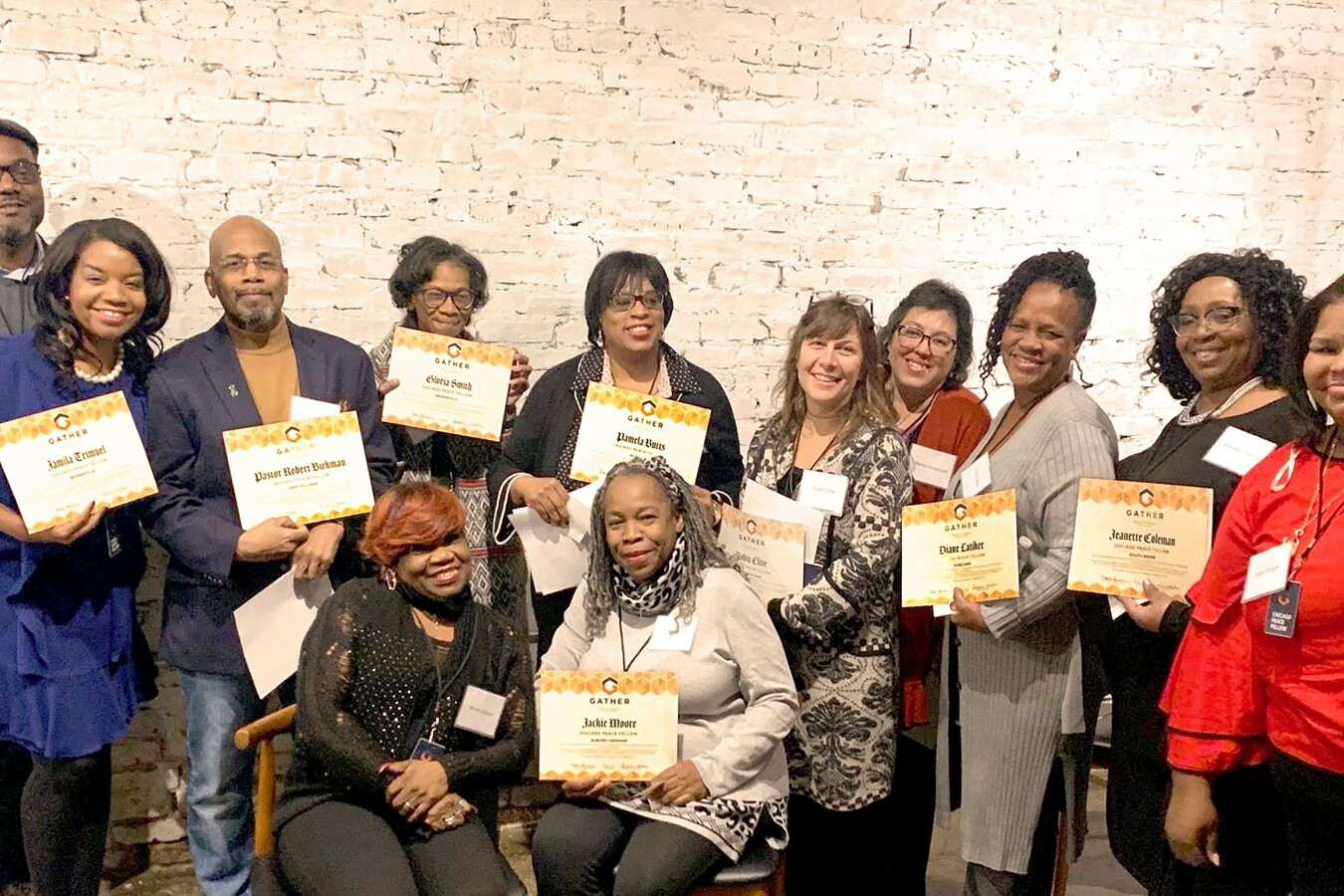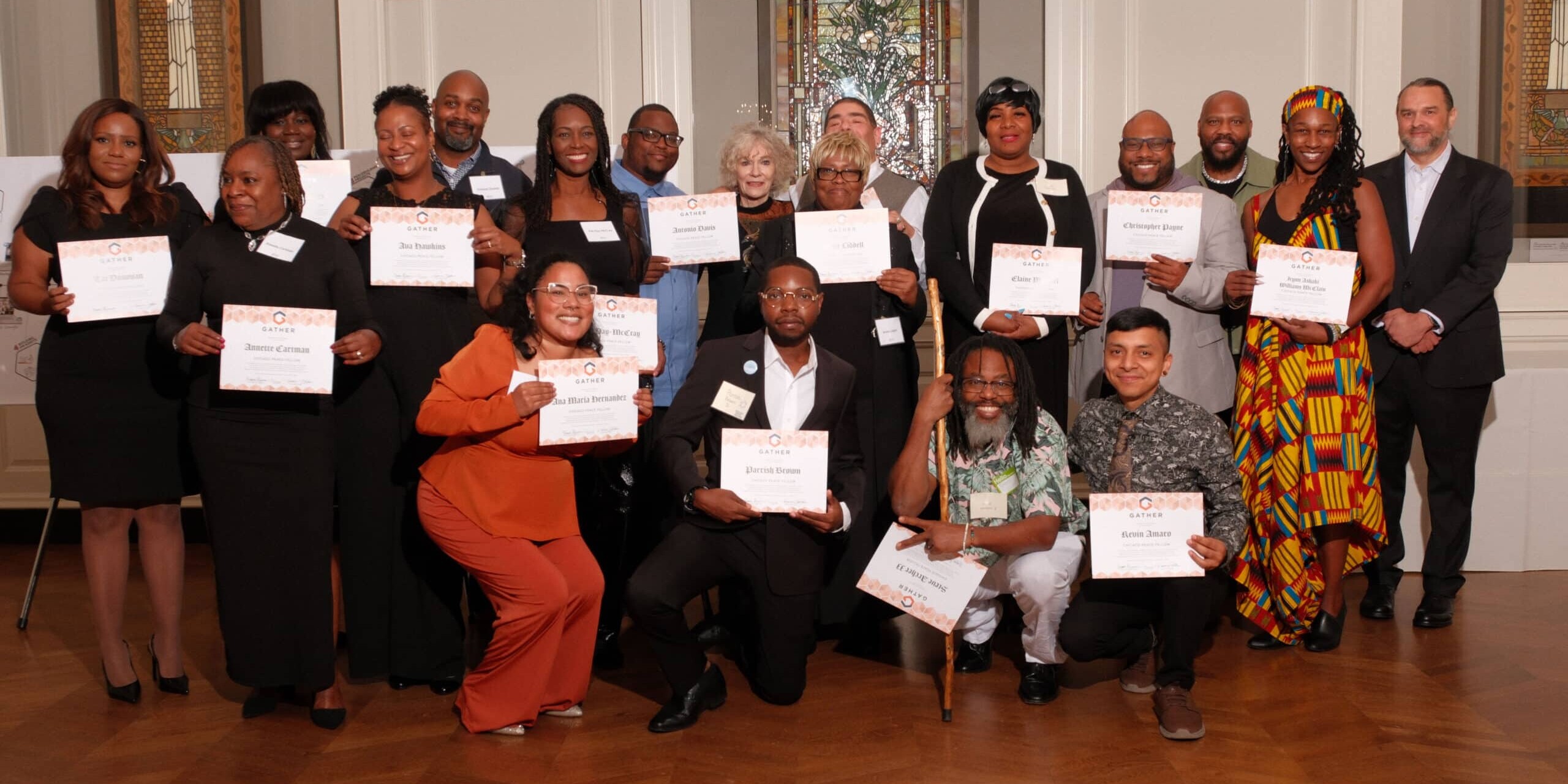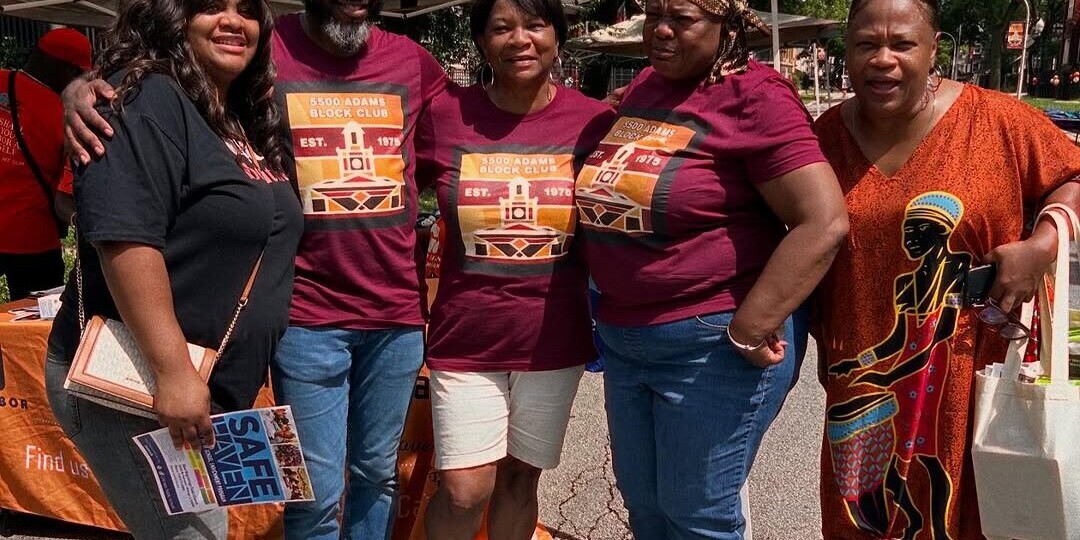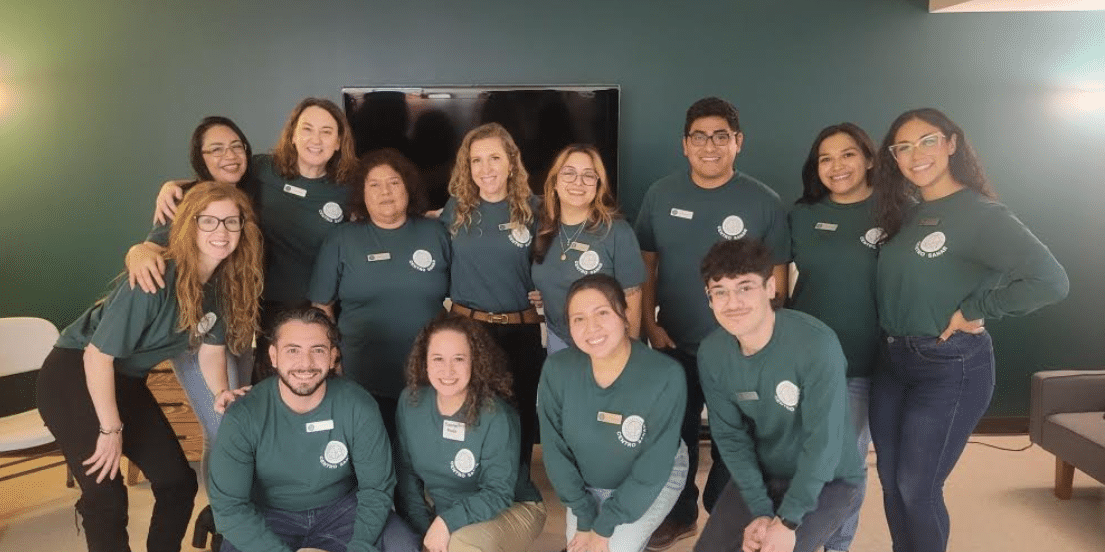By Ethan Michaeli, Senior Advisor for Communications

For Velvian Boswell, being a Chicago Peace Fellow transformed the way she saw her own neighborhood. Speaking to a room packed with family, friends and supporters at the Peace Fellows’ graduation, Boswell, who works as a recovery specialist for the Chicago Women’s AIDS Project, recalled the component of the curriculum in which they were asked to create asset maps of their own neighborhoods. In the beginning, Boswell didn’t think there were many assets in her community, Englewood on the city’s South Side.
“At first, I thought of all the liquor stores,” Velvian said, “but I had to take a step back.”
“We have a lot of history, a lot of people, and a lot of resources in Englewood. That is what I learned as a Chicago Peace Fellow.” — Velvian Boswell
Boswell was just one of 18 grassroots organizers who graduated from the first cohort of Chicago Peace Fellows on November 14 at an event space on Division Street in the Wicker Park neighborhood. Each of the Fellows lives and works in neighborhoods dealing with disproportionate rates of crime and violence, and they celebrated months of work sharing their experiences, learning new techniques, and expanding their networks as well as acquiring new contacts and resources.

The Fellows will join the Goldin Institute’s international cohort of grassroots organizers around the world who are developing innovative strategies for empowering their neighbors and fostering healing in areas torn by war and natural disaster. The Peace Fellows were trained through GATHER, which is both a software and a curriculum designed by the Goldin Institute to facilitate peer-to-peer learning.
“This is one of those moments when life comes full circle,” said Travis Rejman, the Goldin Institute’s executive director, introducing the Peace Fellows at the event.

Travis described the Goldin Institute’s origins in 2002 during a week-long conclave in Chicago that brought together an unprecedented roster of grassroots organizers from around the globe. Participants studied the city’s rich history of community organizing, and shared the wisdom they had acquired in their work in different cities before collectively conceiving of an organization that could help grassroots organizations foster conversations, build their networks, and tap new resources.
“We’ve been pursuing those principles and putting them into practice over the last 17 years in over 50 countries. The key to our mission to create spaces for grassroots leaders to learn and work together so they can connect around issues they care about and collaborate across borders.” — Travis Rejman
The Peace Fellows program, Travis explained, was built on the lessons learned through these years of work and especially through the international GATHER Fellows. The asset map Velvian described is just one of the exercises designed to “understand power, privilege and race, and the intersectionality of how those forces intersect with our peace building.” All of the components of the curriculum were calibrated to “center voices of those who are often excluded, knowing that those who have the most at stake and the most wisdom.”

Overall, the Peace Fellows participated in 50 workshops, trainings and meetings with civic leaders, at least one event every two weeks and many weeks with multiple events. In addition to the shared learning sessions, the Peace Fellows collaboratively planned 8 projects in the summer and beyond with special funding from the Chicago Fund for Safe and Peaceful Communities.
“Over the past 17 years working in over 50 countries, we’ve seen that real and sustainable change is always rooted in the power of communities building on their assets and inviting voices people on the front lines to make decisions,” Travis said.
Goldin Institute Program Coordinator Burrell Poe praised the Peace Fellows for their dedication and assiduity, and welcomed them into the “community of practice” with the GATHER Fellows. An organizer himself, Burrell said the mutual support was essential for effecting change.
“It’s really about how do people who do the work stick together, how do they support each other,” Burrell said.
“At the end of the day, if I’m someone who’s working hard in Englewood, it’s nice for me to know someone who’s working hard in Austin. That connection is powerful because we’re doing the work in our own communities and sometimes we can feel so alone and being together a community of practice is so important.”
Peace Fellow Frank Latin, the founder and executive director of Westside Media Project, recalled one workshop at the Institute for Non Violence Chicago, where they spoke with case workers and others engaging with young men in the community at high risk for being both perpetrators and victims of violence. Many of the case workers have personal experience with street violence, and Frank remembered the conversation as robust and incisive, piercing the myths that cloud the picture of what is actually happening in neighborhood like Austin on the city’s West Side.

“I got to hear directly from people who look, quite frankly, just like me,” Frank said.
“We got to hear directly from people working on the front lines, some of the challenges that don’t make the news, like why are people carrying guns. Not everyone who is carrying a gun in Austin is a predator. A lot of people were trying to protect themselves, but once you get arrested, you’re going to same jail cell.” — Frank Latin
Frank continued that it as a resident of another neighborhood handling high levels of violence, he knew already that it was a “no brainer necessity” to work with those whose past includes criminality. But often, the prevailing narrative in mainstream media, the academy, and even among social services are wary of direct contact with those most likely to be involved in violence.
“We all come from different points in life and we got to hear from people using resources and what they know in their communities to make a difference,” Frank said.
“We all come together regardless of our backgrounds and what we’ve been through to try and make a better place to live.”
Peace Fellow Dawn Hodges, executive director of Imani Community Development Corporation in South Chicago, talked about the collective planning process for deciding how to fund the summer projects. It took several rounds of very active conversations and lots of sticky notes as well as a few digital tools, but in the end, the Peace Fellows had decided on eight innovative initiatives, each of which involved multiple Fellows.

The summer projects included “Passport to Peace” events, community fairs with peace circles, tai chi classes and other services for community residents, the “Youth Exchange,” an overnight retreat at a Wisconsin camp site for young people from different neighborhoods, and a retreat for the Peace Fellows themselves, a rare opportunity to reflect and discuss.
“The powerful part was those who got funded less but needed more and those who got more we all ended up sharing, so all the projects that were going to be funded got funded,” Dawn explained.
Maria Velazquez, executive director of Telpochcalli Community Education Project in the Little Village neighborhood, admitted that she was not particularly tech-savvy when she received the iPad preloaded with the GATHER software. But she quickly got help both from the Goldin Institute staff and from other Peace Fellows.
That sense of camaraderie was key to the GATHER curriculum’s success for Maria. After 17 years at Telpochcalli, a mostly volunteer organization, she focused on learning new techniques that will make collective decision more effective. But overall, Maria was thrilled to find a new cohort of peers with whom she can share her experiences and challenges.
“Often, we feel very isolated like we are the only ones doing it. Now I have a team of people I can turn to.” — Maria Velazquez
The event continued with comments from other Fellows as well as supporters including Conant Family Foundation Executive Director Leslie Ramyk, who collaborated closely with Travis to fund the first class of Peace Fellows and pledged to do what she could to make sure there would be additional cohorts.
“Thank you for being the inaugural Chicago Peace Fellows. I’m so excited with everything that happened this year. The least I can do – and what I must do – is raise the money so we can do this again.” — Leslie Ramyk, Conant Family Foundation
The graduation celebration closed with a rousing – if slightly off-key – group sing-along led by Peace Fellow Gloria Smith, who wrote new lyrics under the title “We are building up a new world” to the tune of the traditional song “Jacob’s Ladder.”
The Goldin Institute thanks the Conant Family Foundation, the Polk Bros. Foundation, Chase Bank, the Partnership for Safe and Peaceful Communities and our generous network of champions for community driven social change for supporting the Chicago Peace Fellows



